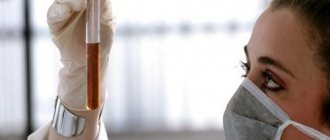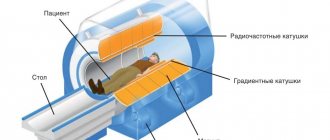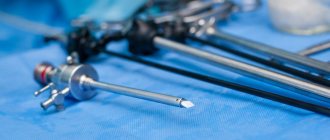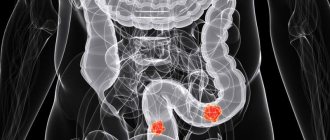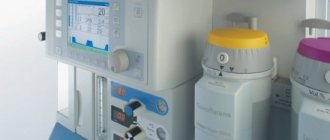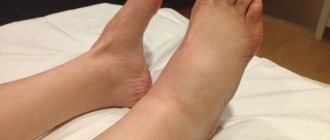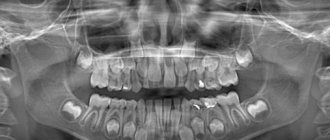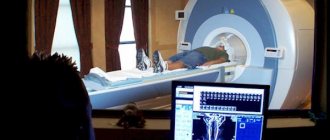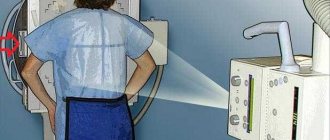The female body is susceptible to any environmental changes. It is known that the menstrual cycle can be disrupted due to stress, against the background of starvation diets, and also be the result of external influences due to which the hormonal background undergoes changes.
Therefore, when a medical examination is vitally necessary, a lot of questions arise: what to do in this case, is it worth taking an x-ray on critical days, what are the dangers of such an examination during menstruation, etc.
What are X-rays
As is known, all tissues of the body have unequal density and, accordingly, different ability to pass streams of small particles through themselves. This characteristic feature allows you to look inside the body without resorting to direct mechanical action.
The research method is based on obtaining a projection image of the anatomical structures of the human body using X-rays passing through it and recording the residual radiation on film.
X-rays are a stream of wave-like electromagnetic energy carried by an elementary indifferent particle - a photon. They are capable of ionizing neutral atoms or molecules, that is, making them active in relation to other substances.
Modern X-ray equipment is highly sensitive, which allows minimizing the period of exposure to the human body. However, experts do not recommend taking X-rays unnecessarily , since its destructive effect can accumulate.
The exception is cases when the consequences of the disease and lack of treatment exceed the harm of such a procedure.
Preventive measures
Before performing the removal and preventing bleeding with a number of complications during menstruation, doctors recommend three days before the operation:
- limit consumption of coffee and products containing caffeine;
- stop drinking alcohol and smoking cigarettes;
- do not perform any operations at this time;
- avoid physical activity and emotional stress;
- do not take a hot bath, refuse to visit the sauna, do not get too cold;
- if the patient has poor blood clotting, it is advisable to take medications that the doctor recommends to improve it;
- stop taking other medications for a while.
If there is no alternative replacement for removal, in particular the development of an abscess with intoxication in the body, the operation is performed without preliminary preparation. After tooth extraction has been carried out, you should follow the advice of doctors, such as:
- After the operation, it is better to spend some time under the supervision of a doctor so that he can observe the blood clotting and the formation of a clot in the hole.
- When a tooth is removed during menstruation, women may experience increased perception of smells, feel dizzy, and even lead to loss of consciousness, and therefore it is better to take a taxi home. Also, drafts and stuffiness will be dangerous in public transport, which is contraindicated.
- You should not self-medicate, but strictly follow the dentist’s recommendations for taking painkillers. Rinse your mouth with solutions recommended by your doctor.
- It is necessary to urgently consult a doctor if there is an increase in temperature or nausea.
- Upon arrival home, it is recommended to be at rest, lie down in the pastel for a couple of hours.
If you have dental disease during menstruation, you should not self-medicate.
When wondering whether it is possible to remove teeth during menstruation, we can say that if there is severe abdominal pain or heavy discharge, it is better to wait a few days. If you have the strength to be patient, you can go to the doctor if your condition is normal and remove the troublesome tooth.
Toothache is one of the unbearable and poorly tolerated pains. This is a signal of a serious, advanced stage of disease of the jaw system. Delaying a visit to the doctor means aggravating your condition. If pain occurs during menstruation, visit your doctor, informing him about your critical days. The doctor will do everything possible to relieve pain and alleviate the condition. Will set a date for treatment after the critical days.
DETAILS: Do-it-yourself dental implantation
Why can't you take an x-ray during your period?
Since the proper functioning of the female body depends on a large number of factors, some experts do not recommend taking x-rays on critical days . Let's consider this issue in more detail.
It is known that there are no direct contraindications to examination of a healthy girl. However, there is a restriction for pregnant and lactating women , since changes in body tissues caused by X-ray irradiation can negatively affect the development of future offspring.
However, during critical days there is a risk of obtaining unreliable data about the physical state of the organs of the reproductive system, since at this time the uterine mucosa is detached. This process produces a small amount of menstrual blood, which may interfere with diagnosis.
There is a generally accepted opinion that radioactive X-rays accelerate the process of endometrial detachment, and this can lead to the opening of uterine bleeding.
In the second phase of the menstrual cycle, increased production of progesterone occurs, which relaxes the muscular layer of the uterus. It has the same effect on the large and small intestines, thereby provoking increased gas formation. Air bubbles and stagnant stool will also prevent good quality images from being obtained.
The need for examination
X-rays during menstruation can be taken when the patient really needs it. A referral for an x-ray is issued depending on the area of irradiation and the individual characteristics of the body. Thus, the procedure is usually used to examine:
- jaws and teeth;
- bones and joints of the arms and legs;
- pelvic and chest organs.
When examining the upper body or extremities, electromagnetic radiation waves are straight in direction and short in length. To protect the pelvis, a special coating is used that smoothes out the negative impact. X-rays of the teeth and jaw usually have no restrictions during menstruation, since severe toothache aggravates a woman’s condition at the beginning of the menstrual cycle.
There is no point in postponing the procedure when it comes to saving a life. In such situations, it is important to make a correct diagnosis, and it is often difficult to do without an x-ray.
Recommendations from gynecologists
Despite the fact that modern X-ray equipment allows minimal impact on the body, specialists are obliged to warn the patient about the development of complications due to receiving a large dose of radiation. Therefore, during unscheduled X-ray examinations, it is recommended to cover the pelvic organs with a special protective apron .
In addition, there is no need to undergo the procedure if you feel unwell and have an exacerbation of inflammatory chronic diseases of the reproductive system .
If an x-ray is necessary for diagnostic purposes to identify the cause of infertility, then the patient is recommended to stop sexual relations from the beginning of menstruation until the day of the examination .
It is usually done on days 7-11 of the menstrual cycle, since at this moment the thickness of the mucous epithelium is minimal and does not interfere with the passage of contrast into the fallopian tubes, thereby making it possible to obtain more informative and detailed images about the condition of these organs.
A little about the research
Radiography is based on the physical property of X-rays to penetrate the tissues of the human body and ionize molecules, thereby producing black-and-white images of the area under study. Despite the fact that the irradiation itself lasts a very short time, it is capable of affecting tissue in a certain way, and the area where the X-rays were directed suffers the most.
The consequences of such a study can appear both immediately and after quite a long time.
Modern X-ray machines scan under conditions of low radiation exposure, but this does not mean that the examination should be treated as a simple examination. Many women, when coming for a study, do not inform the doctor about menstruation, since no one warns them about the significance of this moment. In order to understand whether it is possible to take an x-ray during menstruation, you need to compare many factors.
Is it possible to carry out diagnostics during a delay?
The absence of menstruation can be both a natural process and a deviation. In particular, this sign may indicate a developing pregnancy or hormonal imbalance, therefore, in order to avoid negative consequences, a woman of reproductive age is recommended to make sure that she is not pregnant. The most accurate result can be obtained by donating blood for hCG. However, this method is not always convenient, since it takes time to obtain results. In this case, you can use a high sensitivity pregnancy test.
Effect on menstruation
Some women, after a single x-ray, note the presence of heavy periods or their absence. But do not panic, because perhaps this is the body’s reaction to stress due to the procedure or other external factors.
Carrying out a single examination during menstruation does not threaten anything, but it is advisable to minimize the load on the body during this period.
If a woman is exposed to x-rays several times over a short period of time, her menstrual cycle may increase and the amount of discharge may change . This is explained by the fact that as a result of prolonged exposure to radiation, the synthesis of hormones responsible for endometrial detachment and ovarian function is disrupted.
To avoid negative consequences, patients are not recommended to resort to x-rays too often . If this is necessary, you should notify your attending gynecologist and other specialists, including a radiologist. If menstruation begins unexpectedly, and the day of the study cannot be canceled, then the X-ray room staff must be warned about the presence of discharge. In this case, they must tell about all the consequences and give papers to sign indicating that they are not responsible in this situation.
Folk remedies to help reduce pain
Some folk remedies can help women avoid going to the dentist during menstruation.
Here are a few recipes that will alleviate the condition:
- The folk remedy mumiyo, which is applied to the sore spot every hour and a half, helps to disinfect and relieve inflammation. But first you need to rinse your mouth with a decoction or infusion with chamomile;
- Propolis, a solution of which can be used in alcohol or dry, has an antiseptic and analgesic effect. Alcohol tincture is used for rinsing, and dry leaves can be chewed. The product reduces pain;
- valerian tincture will help dull the pain, which will require applying a drop of tincture to the area of inflammation;
- Apply drops of camphor alcohol to a cotton swab and apply to the tooth or gum;
Chamomile decoction helps relieve toothache
- decoctions of herbs or tree bark for rinsing reduce pain and disinfect the oral cavity. Sage, chamomile and oak bark are excellent for these purposes;
- hand massage in the area of the thumb and index finger helps with toothache. Massaging is carried out on the opposite hand from the diseased tooth, perform at least five minutes in a circular motion.
In conclusion, we note that the menstrual period in the life of every woman is not the best time for surgery. But despite hormonal fluctuations and decreased blood clotting, if urgent procedures are required for life-saving reasons, they should be performed. Therefore, in normal conditions during menstruation, it is better to postpone dental procedures until the end of the cycle and consult a doctor to reduce pain during this time.
DETAILS: Stage 2 of dental implantation
At the time of menstruation, girls often experience discomfort and pain. There are frequent changes in mood, apathy, and overall health deteriorates. During menstruation, emotional imbalance and instability, mental disorders are also observed.
Toothache can occur at the most inopportune moments in life, with poor tolerance and pain relief. Preventing it and relieving pain at home is not always appropriate, or, on the contrary, an effective method. Some diseases of the surface of the enamel and gums require immediate intervention and urgent treatment in the dentist’s office.
A visit to the dentist is considered an important manipulation procedure, however, during the menstrual cycle it is not always beneficial, having a number of nuances:
- During menstruation, blood has poor clotting, that is, it is many times worse than usual. Based on this, some difficulty arises during the treatment itself; even a minor wound can lead to major bleeding. Regarding the dental cavity, a less successful solution, in this case, would be the manipulation of tooth extraction, since during the work an unforeseen situation may arise, which will lead to complications.
- During a visit to the dentist, sensitive women may feel dizzy, feel nauseous, and deteriorate in physical condition.
- During menstruation, chronic diseases may worsen in women.
If a woman is going to visit a dental surgeon, having previously consulted with him about tooth extraction, then there are a number of features that will help her undergo this manipulation more easily.
It is recommended not to consume or even reduce to a minimum foods and drinks such as coffee, cheese and chocolate during menstruation, since they can affect the female body (a woman’s general mood, its changes, and heartbeat, may cause anxiety).
At the time of menstruation, it is considered undesirable for the female body to take medications, for example, Aspirin, since this medication thins the blood. However, to relieve pain, doctors recommend taking medications such as: No-spa, Paracetamol, Ibuprofen. It is these medications that will not contribute to even more severe bleeding of the uterus.
Women who prefer bath procedures prefer a hot bath rather than a shower; it is advisable to avoid such actions during their period. The bathhouse is not considered a sterile place, despite the fact that high temperatures contribute to the activation of heavy menstruation.
If you have to postpone a visit to the doctor to eliminate toothache, you can take a painkiller (after studying the contraindications according to the attached instructions). Take an Analgin tablet (no more than 4 tablets per day), put half of the tablet on the tooth. Very severe pain can be relieved with the powerful drug Ketanov. (Read the instructions - may cause allergies!). Folk recipes and herbal decoctions with analgesic properties will help to pacify the pain in the molar:
- Rinse your mouth with a soda-salt solution every 2 hours. Dissolve a teaspoon of soda and salt in 0.5 liters. warm boiled water. The solution soothes the nerve endings of the molar and inflamed gum tissue.
- You can rinse your mouth with a solution of soda with the addition of 2-3 drops of iodine.
- Rinse your mouth with a warm decoction of sage, chamomile, St. John's wort or calendula. For a glass of boiling water 1 tbsp. dry herbs, infuse, strain. This rinsing is not recommended in the presence of pus (flux).
- Add calamus root (1 tbsp) to a glass of water and keep in a water bath for 10-15 minutes. Infuse, strain, rinse.
- Apply a cotton swab soaked in clove or fir essential oil to the sore tooth.
- try holding vodka or propolis tincture in your mouth, then spit it out. Apply a piece of propolis to the problem tooth. Or rinse with a solution: half a teaspoon of alcohol tincture of propolis in a glass of water.
